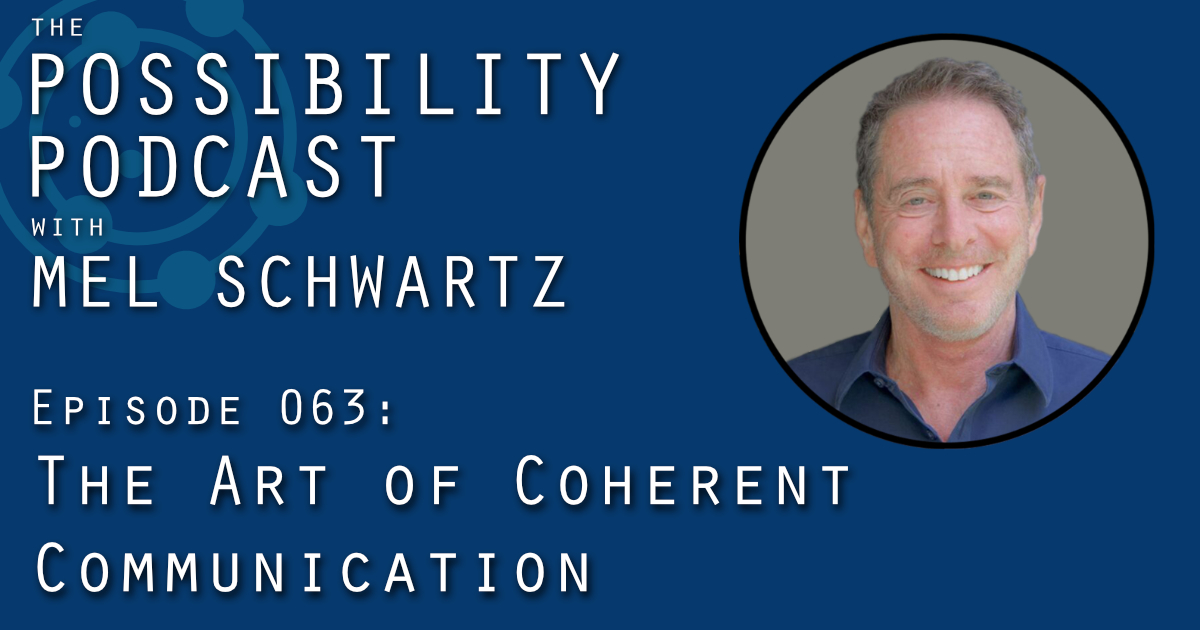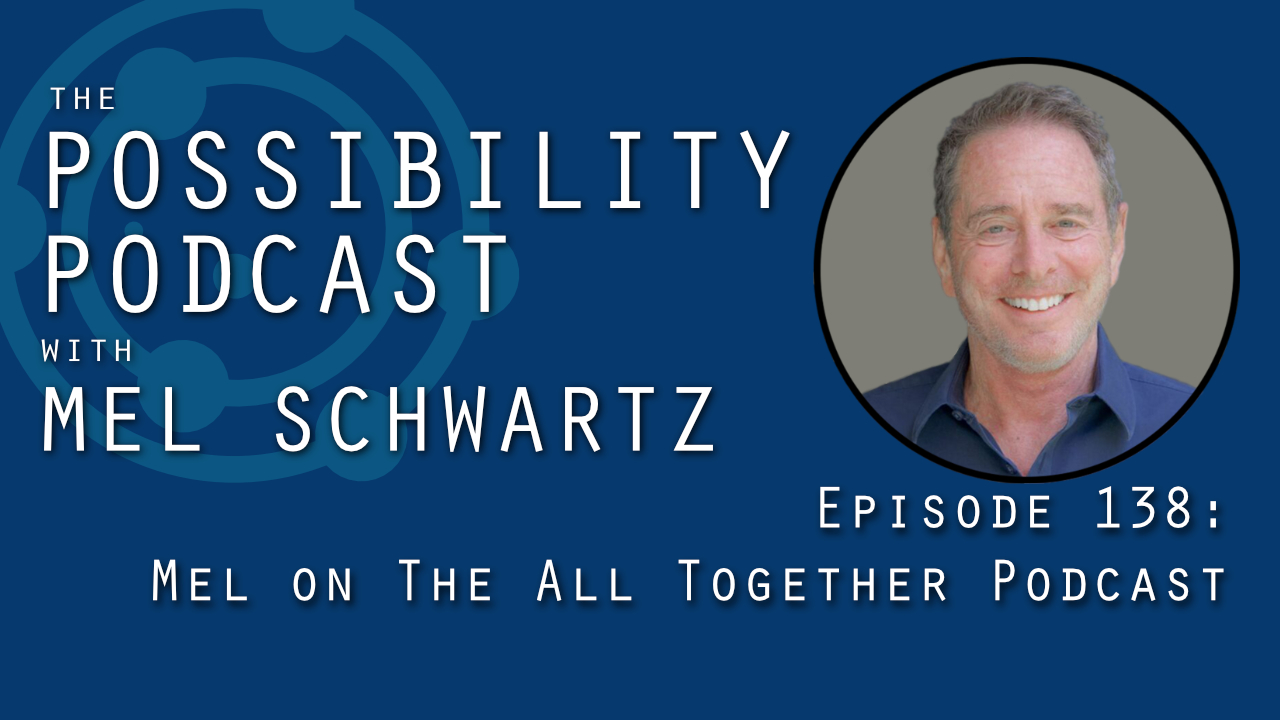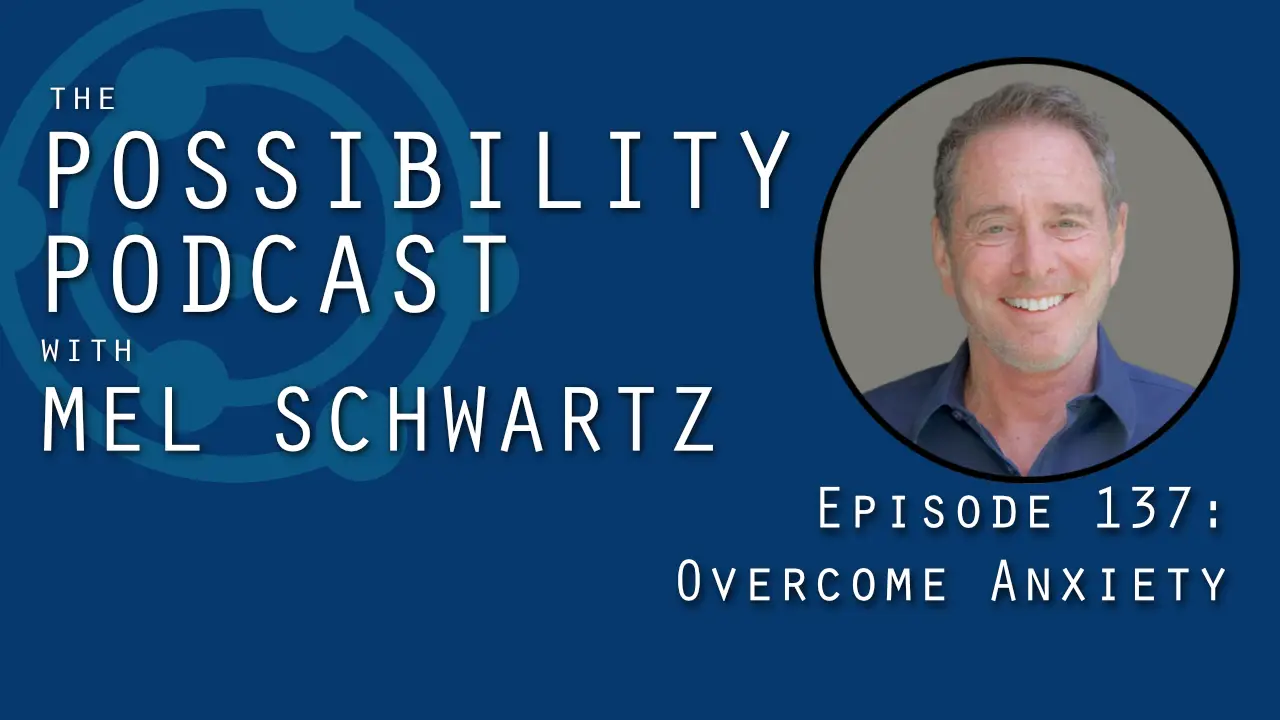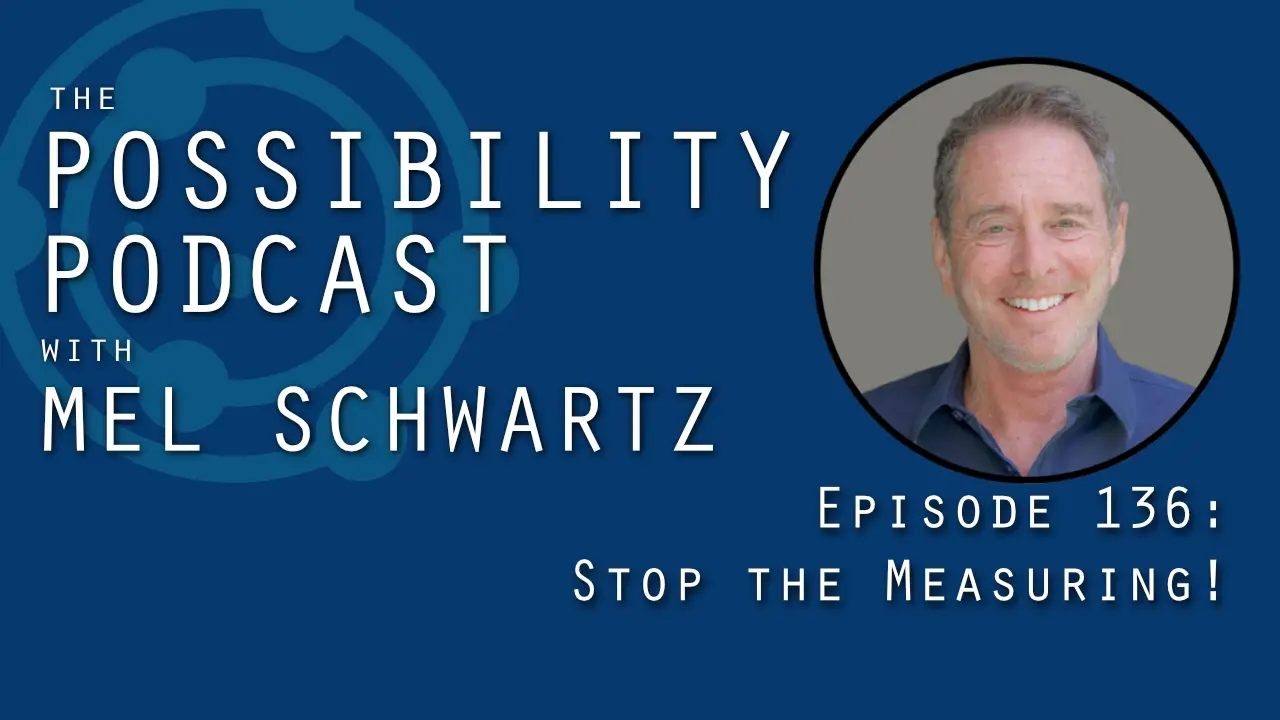Podcast: Play in new window | Download
Episode 063 of the Possibility Podcast with Mel Schwartz explores the benefits of coherent communication: that unfortunate but common phenomenon wherein we assume we understand what the other person is saying, but fall short.
Listen as Mel examines…
Interested in bespoke marriage and relationship counseling from Mel Schwartz? Reach out!
- …why it’s so important to remember that words have different meanings to different people
- …how unexamined context and nuance can lead to damaging misunderstanding
- …the importance of talking with someone, not past someone
- …why maintaining a beginner’s mind and a curious approach is so healthy
- …how expressing subjective feelings can open and disarm a difficult conversation
How are you with coherent communication? Leave a comment; let’s talk about it!
Want to watch this episode?
Transcript of The Possibility Podcast with Mel Schwartz #063
Hello everybody and welcome to today’s episode. We’re going to be diving into the nature of our communications and our conversations today, and we’re going to try to take a look at why they fall short, why they’re incomplete, why they’re not fulfilling, and the impact that has on our relationships.
I often say that our communications just aren’t coherent, or to put it more bluntly, our communications are incoherent. They don’t line up.
What does incoherent mean? On one level it means, “I don’t understand you,” but this type of incoherence is beneath the surface. It’s an incoherence whereby we think we understand each other, we think what each other is saying makes sense to us, but we don’t inquire, and we end up having a communication that misses the mark.
Words have different meanings and nuance and context and history to each of us. But we treat the words as though they mean exactly the same thing to all of us. That’s an absence of what I call shared meaning, which I’ll be moving into shortly.
Sometimes I’m listening to a conversation — and I’m not just discussing now as a couples counselor — I can listen to two friends talking or two people waiting online for coffee and I hear them communicating with each other, but because my mind has been trained to really pay attention, I realize that after a few minutes, they’re actually talking about two different things but they think they’re talking about the same thing.
No one is checking in and corresponding with the other. There’s a lack of actual correspondence. Correspondence means that both people are engaged in a way where there is a shared meaning. When I listen to conversations I hear misunderstanding, sometimes turning into conflict, and a tremendous amount of missed opportunities to resolve issues because there’s a lack of coherent communicating. You know we take for granted that our words convey exactly what we intend them to. They do not. This is a very misinformed assumption. With some moral scrutiny, we can see that our words, and the concepts beneath the words, are not received in the way we intend them to be. And after a few sentences have passed there’s a totally miscommunication, only nobody’s raising their hand, typically, and announcing that. It’s even more problematic because both people don’t even know it.
But how often do we pause into communication and stop and ask the other person what the word means to them that they’re sharing, because we want to get it right? You know, if you’re speaking to somebody whereby english is their second language, or a third language, we wouldn’t use idiomatic expressions or slang because we know they don’t get what we’re saying. Same thing happens when we’re all native speaking English speakers. Now: how can we discuss or argue or understand the virtues of something when we’re speaking somewh at different languages? The subtleties and the nuances might still be different for each of us, so we need to appreciate what these differences are so that we can communicate effectively. But we don’t.
You know, we have different emotional backgrounds. So our words have different impacts. For example: Let’s say you grew up in an abusive home and you had an alcoholic parent, and when they said to you, “That’s a mistake” and that sentence came before a physical outburst, the word “mistake” would really be laden to you. It’d be all full of fear and anxiety. To someone else, a mistake is no big deal. But when you say, “That was a mistake,” the reaction you get is based upon the history of what that word connotes. Now, I have shared, in other episodes, a story about the word intimate. Having worked with a couple many years ago they got into the proverbial argument. She said to him, “You don’t know how to be intimate.” He got his back up and said, “I don’t know how to? I certainly do. It’s you.”
I had to pause and ask them each to share what they meant by this word, “intimate,” so they could have a coherent communication. When you defend your territory, when you repudiate back and forth without curiosity and without asking, everything is lost. So what happened with that couple?
She said that “intimate,” to her, meant emotional and verbal intimacy. Getting into the words and the feelings and sharing them. His back was up because he was referring to sexual intimacy. How could they ever resolve an issue, let alone have a peaceful sensible conversation, when they didn’t take the time to discuss what this intimate mean?
Now, let’s suppose for the purpose of coherent communication, which is what I’m advocating today, she says to him, “You don’t know how to be intimate.” Now, he doesn’t react. He becomes curious. And he doesn’t need to be right, and he says to her, “Wow. That feels hurtful, but please tell me what you mean by this word ‘intimate,’ and how you feel that I’m failing you.”
Now that response might actually spark a generative discussion instead of breaking down into this meaningless argument. Of course the problem would lie with her as well as with him. He’d have to be really far along in learning shared meaning and dialogue to be able to reflectively inquire and not be reactive. So she might have leaned in and said, “I’m feeling really sad and shut down. You don’t share your private thoughts and feelings with me. I feel like we’re just strangers going through life together. But we’re not really connecting. Do you feel the same way about me?”
Imagine how differently that conversation would flow if she didn’t just throw out the word “intimate.” Get underneath the word and explain what you’re feeling and what your perceptions are. Another thing that gets in the way of coherent communication is curiosity. We have to get beneath the surface, the surface other words. What ends up happening in conversations is we have a series of fragmented transactional data dumps. We’re not connected and we so fall so short of genuine communication. This leads to frustration, conflict, boredom, and disarmony.
If relationship is challenging, if relationship success is such a high reach, understand that a big part of it has to do with the absence of coherent communicating.
Let’s look at the word “love.” One person says to their partner, “I love you.” The other one responds, “No, you don’t.” Are they speaking of loving one another, “I love you,” or being in love, the more romantic affect? Is anyone clarifying what this word means? You know, in the Greek language, there are so many words for love — I think twenty one — the Greeks clearly appreciated all the nuances to this word. We need to take the time to illuminate and appreciate what we’re trying to say and communicate through words. What sense does it make to argue about whether you’re intimate or you love me or not if we’re talking about different things? We have to get past the word and the label and find shared meaning in our communication.
When we ask each other what the word of the phrase means, we’re actually being very intimate and respectful. Take the time to slow down and inquire as to what the other person is intending to convey. Say to them, “I think this is what I’m hearing. Is that what you’re meaning for me to hear?”
Curiosity helps us overcome transactional back and forths that are ping-pong matches and they frustrate us. But what we do is we have a compression of data that gets exchanged, but with an absence of meaning the words fly back and forth and we disconnect horribly. Again, this leads to boredom and dissatisfaction and conflict. The impact on relationships, as you can imagine, is enormous.
So what do we need to do? Slow down. Again: Slow down. Reflect. Ask questions. Ask, “Does this make sense to you? I want to make sure you’re getting this the way I’m intending it.”
Get feedback. Illicit feedback. Ask what the word or expression means to them; share what it means to you. You know what I feel may not very well be the same as what you feel, so it’s “tell me more,” open up to the Zen Beginner’s mind. Empty your mind and become a vessel of curiosity, and ask yourself: “Am I listening, or am I judging and reacting? Am I preparing my answer and my response? If I am, I am not listening. If I’m listening, I’m going to have some questions.”
Not prosecutorial questions, questions that come from curiosity. See what I’m feeling informs how I see you, and I have to share my feelings, not my objective truth. Superficial transactional ping-pong exchanges lead to futility, boredom and depression.
So when we ask someone, “How are you,” we shouldn’t be robotic. We should move into real answers and open up and share. Coherent communicating, which tends toward dialogue — dialogue is a free and open deep inquiry. It’s a shared inquiry, but in our frenzied, fast-paced lives, we don’t inquire. We don’t take the time to ask. This leads to disrespect of ourselves and of others. Coherent communication, which requires shared meaning, slowing down, understanding the nuances and the context of these words and how they’re different for each of us: These are the pathway to healthy communicating and ultimately to healthier relationships.
I’ve just touched today upon one of the vehicles toward communicating effectively and meaningfully, and they will be much more to come. I hope you enjoyed this episode. There’s so much more to come on this topic, and we’ll be exploring this in much greater detail around the different flavors of effective, meaningful communication.
Until then, I wish you well, I wish you peace and health, and I look forward to speaking with you again soon. Bye for now.
Subscribe to The Possibility Podcast with Mel Schwartz
Don’t miss a single Possibility Podcast with Mel Schwartz! Subscribe for free in iTunes / Apple Podcasts, Spotify, RadioPublic, Spreaker, or wherever you listen to podcasts. Or, simply copy / paste the RSS link directly into the podcast app of your choice!
Please Rate and Review
If you enjoy The Possibility Podcast with Mel Schwartz, please take a moment to rate and review the show in iTunes / Apple Podcasts or Podchaser. It only takes a few minutes, and adding your review is as easy as clicking this link.
Your rating and review helps raise the visibility of The Possibility Podcast with Mel Schwartz, especially on iTunes / Apple Podcasts, which is one of the biggest podcasting platforms today. More visibility for the show means more listeners… and that growth means the show reaches — and helps — more people like you.
Thank you!
Talk With Mel!
Help others when Mel helps you: Contact Mel and find out how you can be a caller on the show and ask Mel a question. He’ll put the Possibility Principle to work for you, and your conversation will be recorded for use in a future episode of the podcast so other listeners can benefit.




